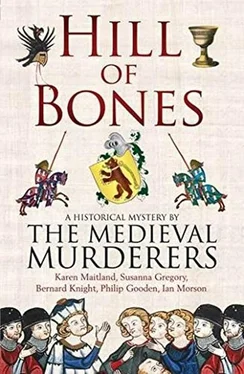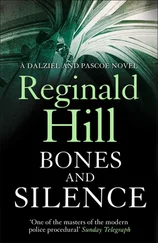Then it was time for the summing-up. One of the few survivors of this violent action – his name was Malcontento – spoke up to explain how these five sudden killings had been necessary on account of other and earlier murders. Naturally, being dead, I didn’t turn my head but kept my eyes fixed on the moon, which was inching its way above the rooftops. In my mind’s eye, though, I saw Malcontento pointing an accusatory finger at me and my fellow corpses. I heard him as he ran through a list of poisonings, stranglings and stabbings before wrapping things up with a couple of little rhymes.
‘An honest life, however low, outweighs
The deeds of these. Each one his debt now pays.
So Heaven’s law trumps false device and reason,
May their guilty blood wash off all sin and treason.’
There was a pause to allow this harmless moral to sink in, before we corpses rose from the dead and joined our fellows at the front of the makeshift stage to acknowledge the plaudits of the audience. To judge by their clapping and their calls, they seemed pleased with our depiction of the lechery and violence that everyone expects to find at the court of an Italian duke, especially one who’s planning to marry his half-sister after disposing of her husband. We – or rather our author – had even included a scene in a madhouse, something that audiences of every type and class always appreciate.
Finally we players did a little jig in gratitude and as a way of bringing our performance of A House Divided to a merry close. In truth, we were already well disposed towards the audience. They had been more respectful than a London crowd – but then any crowd is more respectful than a London one – and although we didn’t have an exact tally on the amount of money brought in by the ‘gathering’ taken before the performance the word was that the citizens of the city of Bath had been open-handed. And this sum would be supplemented by a grant from the town corporation, since they wanted to keep in good odour with our royal patron.
We finished our jig with a flourish and filed behind the curtained screens that provided the off-stage area. We were playing in the yard of the Bear Inn, which lies off Cock Lane in the central part of Bath. The Bear didn’t have the amenities of our own Globe Theatre or fashionable London venues such as Blackfriars. In fact, it didn’t have any amenities at all apart from the hastily erected stage, some moth-eaten drapes and, for furniture, a table, a few stools and an imposing chair (the duke’s throne) provided by the landlord, Harry Cuff. Everything else – props, costumes, masks, face-paints – had to be laboriously transported from town to town across the kingdom by wagon. But there’s a special quality to being out on the road when the weather is fair and the audience is made up not of jaded Londoners but honest provincials eager for entertainment provided by the cream of the capital’s players.
We of the King’s Men certainly regarded ourselves as that cream, pouring out our riches as we progressed across the West Country to our last destination of Bristol. This was home territory for me, Nicholas Revill, a member of the King’s Men for more than six years by now. In the latter days of Queen Elizabeth’s reign I had arrived in London from the village of Miching, which lies to the south-west of Bristol. If you climb the hills above this village there is a fine view of the channel that separates England from Wales. My father was the parson of the village and my mother the parson’s wife. They and many other folk in Miching died in an outbreak of the plague. I was in Bristol at the time, vainly seeking employment as a player, and although I returned home disappointed I soon realised there were greater blessings than finding a job: I was still alive.
With my good parents no longer in this world and no other family to keep me behind, I escaped to the metropolis where I once again had a piece of good fortune when I fell among the Chamberlain’s Men, as they were called at the time. Even then, as the Chamberlain’s, they had a high reputation, with the Burbage brothers as the principal shareholders and William Shakespeare as their principal author. Now King James was our patron, and the Burbages and Shakespeare enjoyed the royal link with a quiet pride. Perhaps it made them reluctant to leave London, for neither the brothers nor WS were with us on this trip to the west.
‘A good audience, this Bath one,’ I said to my friend Abel Glaze. It was he who had tumbled down dead on stage right after my demise, landing a careful distance away.
‘Yes,’ chipped in Michael Donegrace, one of our boy players. A dozen of us were taking turns to shuck off our costumes in the cramped and dimly illuminated area to one side of the stage, before folding our garments and storing them away in one of the tiring-chests. Being on tour meant we had no tire-master to nag us about the tears and lost buttons and stains on our outfits, but equally it meant that each individual was responsible for stowing his garb and keeping it fit for the next performance.
‘You come from this part of the world, don’t you, Nick?’ said Laurence Savage.
‘I believe I have heard Nicholas mention the fact from time to time,’ said Abel.
‘A world separates Bath from my old village of Miching,’ I said.
‘What surprised me,’ said Laurence, ‘was how quick the audience was here, how ready to lap up all the wickedness on stage. I’d heard they were a bit strait-laced in these parts. You know, afflicted with a touch of the…’ He pulled his mouth down and mimed the conical hat that was worn by the Puritans and, as he did so, unintentionally jabbed with his elbow a boy pushing his way through the drapes that fronted the tire-room.
Once he’d recovered from the blow in the stomach, the lad gazed around in wonderment and perhaps alarm. He saw a dozen grown men and a couple of boys of about his own age with their faces still painted and their costumes half off, in the light of a single lantern and a spill of moon from overhead. The boy’s eyes then darted about as if he were searching for someone.
‘Hello, Leonard,’ said Laurence Savage to him. And then to the rest of us: ‘This is Leonard Cuff, son to our host at the Bear. I was chatting to his father this afternoon and had the honour of being introduced to the members of that gentleman’s family.’
Laurence possessed the knack of remembering names and faces even after the most fleeting meeting. For his part, the boy was relieved to recognise a friendly face. He held up a letter.
‘This is for the duke,’ he said in an uncertain voice. ‘Is – is the duke here?’
There was a moment’s silence, then the sharper of my fellows looked at me, realising before I did what the lad was on about. The duke – Duke Peccato, to give him his name – was the Italian part that I had so recently enacted in A House Divided . It was I who had schemed to marry my half-sister, played by Michael Donegrace, and in the process found it expedient to kill off my brother-in-law. My machinations led inevitably to my own violent death and those of my associates, chiefly at the hands of Malcontento, played by Laurence. I was pleased to have been Duke Peccato. It was quite a big part and, more important, it was a very bad part. There’s nothing players like more than a true villain to sink their teeth into. The audience like it too.
‘I am the duke,’ I said. ‘Duke Peccato.’
‘You are?’ said Leonard.
‘Not really,’ I said. ‘That is my part, I mean. My name is Nicholas Revill.’
‘Well, sir, whoever you may be, this is for you.’
The boy handed me the letter rather gingerly as if he thought some of the duke’s evil might have rubbed off on the person playing him.
Читать дальше












